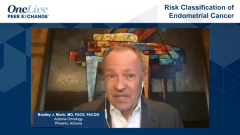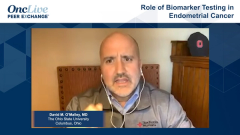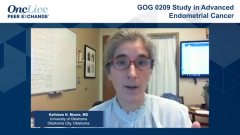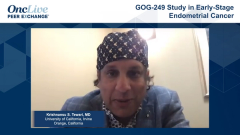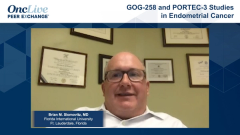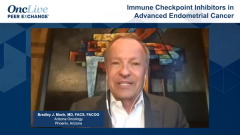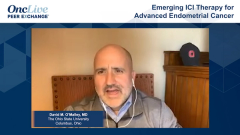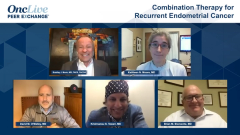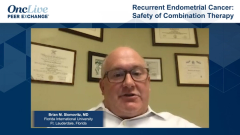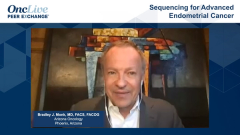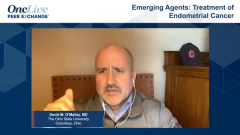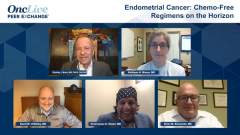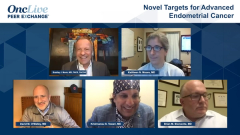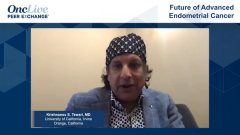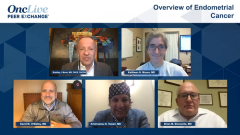
Future of Advanced Endometrial Cancer
Episodes in this series

Bradley J. Monk, MD, FACS, FACOG:I’m going to close. It’s been a lot of fun for me. I’m going to go around, though, and I want you guys to make a prediction. Look into your crystal ball at where we’re going to be in a year. I don’t mean relative to the pandemic. Where is the treatment of endometrial cancer going to be in a year? Are we going to be at the same place? Our field is evolving so quickly that we’re going to be in a different place. I’m going to start with you, Brian. Where are we going to be in a year?
Brian M. Slomovitz, MD: A year is too short to achieve my goal of eliminating chemotherapy-based disease. But we alluded to this earlier, I think we’re going to rely more and more on our molecular classifications. TP53-mutated tumors are going to be treated differently than non-TP53 tumors. I’ll say it in the strongest possible way, all patients with endometrial cancer are going to get immunotherapy before they succumb from their disease. I’m not sure of the exact line, but all patients are going to get some form of immunotherapy.
Bradley J. Monk, MD, FACS, FACOG: Krish or Dave, where do you think we’re going to be in a year? Maybe a year is too close.
Krishnansu S. Tewari, MD: I think in a year, even without the GY018 trial, we’re going to be adding pembro [pembrolizumab] in the first line to adjuvant therapy. I think in 3 years, the front line is going to be pembrolizumab alone.
Bradley J. Monk, MD, FACS, FACOG: Particularly in the MSI [microsatellite instability]-high, yes. Dave, go ahead.
David M. O’Malley, MD: We’re going to see the approval of len/pem [lenvatinib, pembrolizumab] in the recurrent setting for full approval, so our European and ex-US colleagues can have that option for their patients. We need to move and will move with information and education like we’re doing here today with regard to more molecular-based therapy, even in early stage disease. In a year, we’re going to be using more chemotherapy in patients with TP53 mutations, and we’re going to be using, as you said, immune therapy in those deficient patients.
Bradley J. Monk, MD, FACS, FACOG: Yes, thank you for that. Katie, go ahead. Last word.
Kathleen N. Moore, MD: A year is a little short, but I do agree that we’ll confirm len/pem [lenvatinib, pembrolizumab]. I think that’ll be a positive study. That’ll be a confirmatory approval that will go global. I think there are data coming out in the next year that will inform the next series of trials. You brought up KRAS 212B. There’s a lot of work with specific KRAS inhibitors and SHIP2 inhibitors that can target something that’s really common in endometrial cancer; 30%, 35% have a KRAS mutation. What specific KRAS is sensitive?
We’re learning that right now. These studies are ongoing. We’re going to be able to target KRAS. That’s going to open up a bunch of new therapies for our patients. The work being done with molecularly targeted therapies, AKT inhibitor olaparib in particular, is very interesting. I think we’re entering a molecularly guided era beyond MSI and HER2with targets that heretofore were not targetable, which is exciting for all solid tumors. Who doesn’t want to target KRAS?
Bradley J. Monk, MD, FACS, FACOG: Yes, right.
Kathleen N. Moore, MD: We’d like to target TP53 directly, but that’s a little more pie in the sky.
Bradley J. Monk, MD, FACS, FACOG: Yes. Thank you for that. From a practical perspective, and you guys said all these, probably within the year, Dave, dostarlimab will get approved in MSI-high, second line. That’ll be some good competition. Many of you said KEYNOTE-775 will be approved in second line for non–MSI-high, pembrolizumab, lenvatinib, a global approval. To your point, CDK4/6 inhibitor, letrozole will probably get compendium listed, too. We’ll have 3 new opportunities, depending on where you are in the world. Then the molecular staging will evolve with some of these combinations, for those of you who do phase 1 studies, that we haven’t thought about because we’re better defining these unique populations and going from heterogeneity to homogeneity. I want to thank you four. I know you’re very busy here. It’s been fun to see you. Thank you all for this rich and informative discussion. Thank you.
Transcript Edited for Clarity


